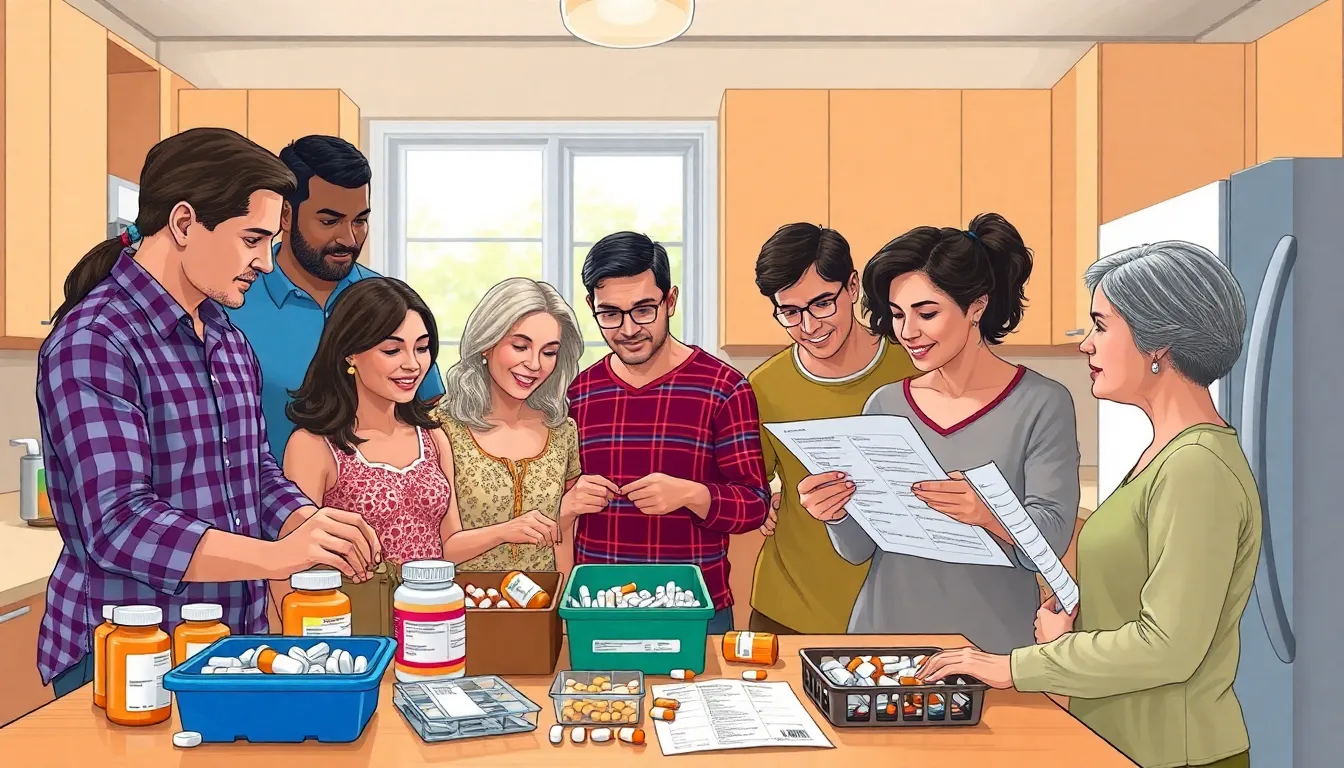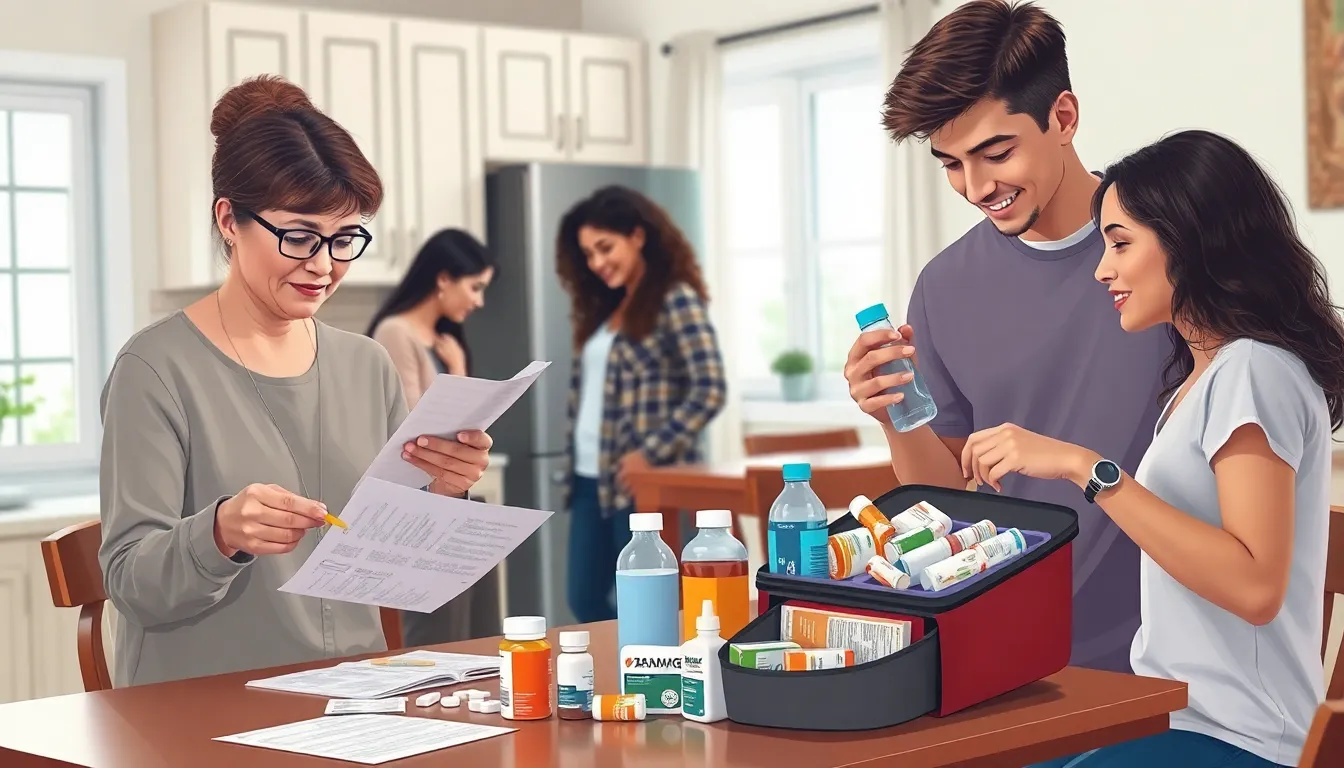When disaster strikes, the last thing anyone wants to worry about is running out of their essential prescription medications. Imagine trying to fend off a zombie apocalypse while also dealing with a sudden shortage of your blood pressure pills—talk about a double whammy! Being prepared isn’t just for doomsday preppers; it’s for anyone who values their health and sanity in unpredictable situations.
Emergency preparedness for prescription drugs means more than just stashing a few extra pills in the back of the pantry. It’s about having a solid plan that ensures access to vital medications when life throws a curveball. With a little foresight and some good humor, anyone can tackle this essential aspect of emergency readiness. So let’s dive into the world of medication preparedness and learn how to keep those prescriptions safe and sound, no matter what chaos might come knocking at the door.
Emergency Preparedness Prescription Drugs
Preparedness for emergencies includes having essential prescription medications readily available. Many individuals rely on these medications for chronic conditions, making access vital. Maintaining an adequate supply supports ongoing health and safety during unpredictable situations.
Planning beforehand ensures that medications do not expire without usage. A person might face difficulties accessing pharmacies during disasters or emergencies. Storing an extra supply of prescription drugs helps mitigate potential gaps in availability.
Understanding medication needs is crucial. Some individuals require specific drugs to manage conditions like diabetes, hypertension, or asthma. Assessing personal medical requirements allows for informed decisions when stocking up on medications.
Regular communication with healthcare providers supports compliance and effective management of prescriptions. Doctors can assist in developing a comprehensive plan tailored to unique medication needs.
Consideration of refill schedules plays an important role in preparedness. Knowing when prescriptions require renewal helps prevent running low during emergencies.
Educating family members on medication management enhances overall preparedness. Everyone involved benefits from understanding when and how to access necessary medications.
Finally, addressing the importance of storing medications in a safe, accessible location cannot be overstated. A designated spot ensures easy retrieval when needed. Emergency preparedness for prescription drugs serves as a cornerstone for health management during crises.
Identifying Essential Prescription Medications

Emergency preparedness for prescription drugs involves knowing which medications are essential for health. Identifying these medications is crucial for readiness during unforeseen situations.
Chronic Conditions
Individuals with chronic conditions require specific medications for managing health effectively. Regular medications for conditions like diabetes, heart disease, or asthma must be part of an emergency plan. Monitoring refill schedules ensures that supplies remain adequate and do not lead to interruptions in treatment. Patients should maintain open communication with healthcare providers for updates and adjustments to medication lists. Additionally, keeping a list of medications that includes dosages and instructions enhances preparedness. Family members must understand these needs to assist during emergencies.
Short-Term Needs
Short-term medical needs also require attention in an emergency plan. It’s important to consider medications for temporary conditions, such as infections or allergies. Stocking over-the-counter medications, like pain relievers or antihistamines, can be beneficial. Knowing the correct dosages and potential interactions helps avoid complications. As emergencies can disrupt access to pharmacies, having a small supply on hand is vital. Planning for short-term needs ensures comprehensive coverage during unexpected events.
Storage And Maintenance Of Prescription Drugs
Effective storage and maintenance of prescription drugs play a critical role in emergency preparedness. Proper conditions ensure medications remain effective and safe for use.
Optimal Storage Conditions
Medications require specific storage conditions to maintain potency. Store prescription drugs in a cool, dry place away from direct sunlight to prevent degradation. Temperatures below 77°F (25°C) are ideal for most medications. Humidity levels should stay below 50%, as excess moisture can damage pill integrity. Keeping medications in their original containers helps protect against air and light exposure. A designated area for medications that is inaccessible to children ensures safety while maintaining organization. Anyone can keep track of medications by creating an inventory that records expiration dates and storage requirements.
Handling Expired Medications
Expired medications pose safety risks and can lose effectiveness. Dispose of them properly according to local guidelines to prevent accidental ingestion. Many communities offer take-back programs that provide safe disposal options. If no programs are available, it’s safe to mix expired drugs with unpalatable substances like cat litter or coffee grounds, then seal them in a container before throwing them away. Always remove personal information from prescription bottles before disposal. Professionals recommend checking expiration dates regularly and replacing expired medications to ensure the availability of effective treatments during emergencies.
Creating An Emergency Preparedness Plan
An emergency preparedness plan requires attention to prescription medications. Taking proactive steps ensures access to vital drugs during unpredictable situations.
Medication Inventory Checklist
A clear inventory of medications establishes a solid foundation for preparedness. List all prescription drugs, including dosages and frequency. Ensure storage conditions are ideal, maintaining a cool, dry place away from sunlight. Include over-the-counter medications for short-term needs, noting any interactions with prescription drugs. Regularly assess inventory levels, replacing expired medications and refilling prescriptions before low stock occurs.
Communication With Healthcare Providers
Regular communication with healthcare providers strengthens emergency planning. Schedule check-ups to discuss medication needs and possible changes. Providers can offer updated prescriptions and necessary refills. Educating family members about medications fosters a team approach in emergencies. Additionally, providers can suggest alternatives should primary medications become unavailable during crises. Understanding these details supports informed decision-making and enhances health management during emergencies.
Conclusion
Emergency preparedness for prescription drugs is essential for maintaining health during crises. By developing a comprehensive plan that includes an adequate supply of medications and effective communication with healthcare providers, individuals can better navigate unpredictable situations.
Regularly assessing medication inventories and understanding personal needs ensures that crucial prescriptions are always available. Safe storage and proper disposal of expired medications further enhance preparedness.
Ultimately, taking proactive steps today can make all the difference tomorrow, allowing individuals to focus on what truly matters during emergencies—staying healthy and safe.

